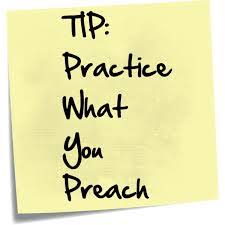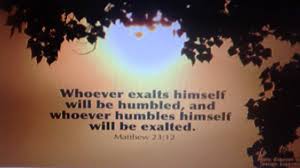
Thirty-First Sunday in Ordinary Time Year A
Prisoners’ Sunday
-05-11-23–
Gospel text: Matthew 23:1-12
vs.1 Addressing the people and his disciples, Jesus said,
vs.2 “The scribes and the Pharisees occupy the chair of Moses.
vs.3 You must therefore do what they tell you and listen to what they say; but do not be guided by what they do, since they do not practice what they preach.
vs.4 They tie up heavy burdens and lay them on men’s shoulders, but will they lift a finger to move them? Not they!
vs.5 Everything they do is done to attract attention, like wearing broader phylacteries and longer tassels,
vs.6 like wanting to take the place of honour at banquets and the front seats in the synagogues,
vs.7 being greeted obsequiously in the market squares and having people call them Rabbi.
vs.8 You, however, must not allow yourselves to be called Rabbi, since you have only one Master, and you are all brothers.
 vs.9 You must call no one on earth your father, since you have only one Father, and he is in heaven.
vs.9 You must call no one on earth your father, since you have only one Father, and he is in heaven.
vs.10 Nor must you allow yourselves to be called teachers, for you have only one Teacher, the Christ.
vs.11 The greatest among you must be your servant.
vs.12 Anyone who exalts himself will be humbled, and anyone who humbles himself will be exalted.”
*******************************************************************
This week, we have just two commentators available from whom you may wish to choose . Scroll down to the required author.
Michel DeVerteuil: Lectio Divina with the Sunday Gospels – Year A
Donal Neary S.J. Editor of the Messenger
****************************************
Michel DeVerteuil
Lectio Divina with the Sunday Gospels- Year A
www.columba.ie
General Comments
Today’s gospel passage contains several different teachings, each of them very deep and relevant to us today, and each expressed in its own imaginative language. Since they are all so special it might be better to focus on each one individually although we may come to see a common thread running through them all.
A point to note is that the teachings are addressed to two different groups:
* the “scribes and Pharisees” on the one hand,
* the “people and his disciples” on the other.
In fact the focus shifts so that it is now one group that is being addressed and now the other. In our meditation we need to be conscious of the group being addressed and of how we identify with each.
*The Pharisees are those in authority who adopt false values. A good meditation on them will avoid two errors – self-righteousness on the one hand, playing down the evil of what they do, on the other. We can avoid self-righteousness by recognising something of ourselves in them (even if in a reduced way); we feel the evil of their ways by entering into Jesus’ indignation.
* The “people” are us when we let ourselves be oppressed by others and some Jesus helps us to discover our freedom and dignity.
 In either case we celebrate Jesus, the great teacher and leader:
In either case we celebrate Jesus, the great teacher and leader:
– he is fearless in confronting the scribes and Pharisees, reminding us of times when we have been challenged by people, events or institutions – perhaps a Biblical word;
– he believes in the common people and is deeply respectful of them – a wonderful model for community leaders, catechists and spiritual guides. A model too for the Church community in our time.
Textual Comments
Verses 1 to 3 are addressed to the common people.
Jesus reassures them – they must not let themselves be awed by those in authority who do not practice the noble things they proclaim.
We remember times when we allowed ourselves to be overawed by others because:
– they were better educated,
– they belonged to a higher social class, ethnic group, culture or religion with a higher status,
– they were more “respectable” in the eyes of our Church community, neighbourhood, society.
Then some Jesus came into our lives (as individuals, Church community or culture) and freed us from this dependency. We saw that those we had placed on a pedestal were flawed like all human beings and we felt liberated.
Verses 4 to 7 are addressed to those in authority.
Verse 4 speaks of their tendency to hand down laws without compassion. We think of
– church leaders unwilling to spend time counselling pregnant girls but condemning them when they have an abortion,
– education (including religious education) as handing down information rather than consciousness raising.
Verses 5 to 7 speak of the Pharisees’ desire for external signs of honour. “External signs” for us will include the different ways (including subconscious ones) in which we look for approval from our peers or from the wider community. This is a defect we can observe in the Church as well.
We read these verses from two points of view:
*remembering moments of grace when we or our community became conscious of these faults in ourselves,
* celebrating Jesus people who brought us to this consciousness.
We think of the great men and women, in our time and in history, who have challenged the structures of our organisation – including the church!
 Verses 8 to 10 return to the common folk, reminding them of their right to be guided by conscience. This passage has been crucially important for the development of our church’s wonderful teaching on the primacy of the individual conscience.
Verses 8 to 10 return to the common folk, reminding them of their right to be guided by conscience. This passage has been crucially important for the development of our church’s wonderful teaching on the primacy of the individual conscience.
We celebrate the great theologians who have courageously upheld this teaching in the face of authoritarian tendencies in the Church, e.g. Cardinal Newman, Bernard Haering, Hans Kung. They have been Jesus for our time.
Verses 11 and 12 (returning to those in authority) can stand on their own but we can also read them in the light of the previous teachings;
– vs. 11 is a commandment, but we must avoid all moralising and read it as a story of grace – Jesus bringing good news. In Jesus we celebrate “great people” – teachers, leaders, spiritual guides – who taught us by word and example to reject the arrogance of authority figures (the “Scribes and Pharisees” of our community) and who put themselves at the service of all;
– vs. 12 is a factual observation which we are invited to recognise from our experience. It raises two possibilities:
* very gifted people “exalted themselves” and ended up “humbled” – looked down on by those who formerly admired them. Here again we must be careful to avoid self-righteousness. A sign that we have done so is that we feel very great sadness at the memory. What a pity!
* truly great people “humbled themselves” and were “exalted“, they gave themselves in humble service and are now widely admired. Some have made the passage on the world stage, e.g. Gandhi, Martin Luther King, Dorothy Day; others in the context of our daily lives, e.g. parents, grandparents, teachers, neighbours.
We must not move too quickly to the second stage but spend time remembering (celebrating) the years of frustration. Our overall response must be from the heart – what a privilege to have known people like that!
The saying is a powerful reminder of how life brings surprises; it invites us to celebrate the Jesus who prepared us for this. It is also a call to the Church to speak its prophetic word, warning our culture of how false its values are.
Prayer reflection
“A seemingly powerless person who dares to cry out the word of truth and to stand behind it with all his person and his life has surprisingly greater power, though formally disenfranchised, than do thousands of anonymous voters.”
…President Havel of Czechoslovakia, speaking out when he was living under the communist regime.
Lord, we thank you for those who live under tyrannical regimes and keep up the spirits of fellow citizens, telling them, like Jesus, that they have to obey those who occupy the chair of authority, and do what they say, but they must be guided by their own values,
and not the values of those who preach lofty principles and do not practice them.
Lord, we who hold positions of authority in the Church wear garments that attract attention; we are always given places of honour at banquets and front seats in places of worship; people often greet us obsequiously in market places and give us titles of honour.
Preserve us, Lord, from setting store on all these things;
remind us that the greatest thing in our lives
is to be at the service of your people.
“I shall not fear anyone on earth. I shall fear only God.
I shall bear ill will towards no one. I shall not submit to injustice from anyone.”
…Gandhi
 Lord, there are times when people in authority hold us in bondage.
Lord, there are times when people in authority hold us in bondage.
We are terrified of displeasing them, whatever they say is Bible truth to us.
Then you send a Jesus person into our lives who teaches us about our own dignity
– that we have only one Master and all men and women are brothers and sisters to us;
– that we have only one Father, and he is in Heaven;
only one teacher, the Christ.
Thank you, Lord.
“The important thing for a woman soldier to remember is not to show weakness. We wouldn’t give men that satisfaction.”
…A woman officer in the Trinidad and Tobago Defence Force
Lord, in our culture no one wants to appear weak. We pray that in our Church communities there may be no great honour for those who pretend to be strong when they are not, and that those who admit to being vulnerable may be respected.
Lord, we thank you for the various Centres that have been set up in our Church
* to care for unwed mothers. They are a sign that we do not merely call for obedience to your laws but help people to bear their burdens.
“Power comes from the people, but no sooner is that power acquired than those who got the power begin to isolate themselves from people.” …Cesar Chavez
Lord, have mercy on us who are in authority in the Church, in the State, in families. How easy it is for us to hand down commandments, tying up heavy burdens and laying them on the shoulders of those in our charge,
but never lifting a finger to move those burdens.
“It is when I am weak that I am strong.”…St.Paul in 2 Corinthians 12:10
Lord, we can always recognize a moment of grace.
It is one when we realise how we had been exalting ourselves
and now feel ennobled in our lowliness.
“Our fear is that a reinforced Europe may choose for its conscience the law of the strongest, the law of militarism, the old law of colonialism and of discrimination because of class, race and sex.”
…Ecumenical Forum of European Christian Women, July 1990
Lord, we pray for the followers of Jesus who are building the new Europe, that they may consider it the highest honour in life to be servants of the oppressed; that among them self exaltation will be held in low esteem while those who humble themselves will be exalted.
****************************************************************
Donal Neary SJ
Gospel Reflections For Sundays Year A
www.messenger.ie
Love Thy Neighbour
‘Practise what you preach’. ‘Walk it as you talk it’. These are sayings we use to highlight that words and actions in our Christian life should harmonise. ‘Love is shown in deeds, not words’ is the ending of the Ignatius’ Spiritual Exercises.
This is the criticism of Jesus about some of the Pharisees: they preached intolerable burdens of the law, and did not observe it themselves, nor help anyone to do so.
 We find out how to be a follower of Jesus by watching him in the gospel, by hearing his word, and by living a life of love and compassion as best we can. We learn from how to relate to others by how he does this himself.
We find out how to be a follower of Jesus by watching him in the gospel, by hearing his word, and by living a life of love and compassion as best we can. We learn from how to relate to others by how he does this himself.
Every religion can get lost in the visible signs of it. Titles in parish or a diocese can take over from the service requested from us. Shows of piety can lead to the self rather than to God. All in our religion should come from the life of Jesus and return to him. ‘You have one teacher, the Christ’.
Maybe today we pay tribute to the teachers among us, especially those who have taught us about our faith and guided us in the ways of faith.
Lord, teach me your ways, your truth
and guide me into your life.